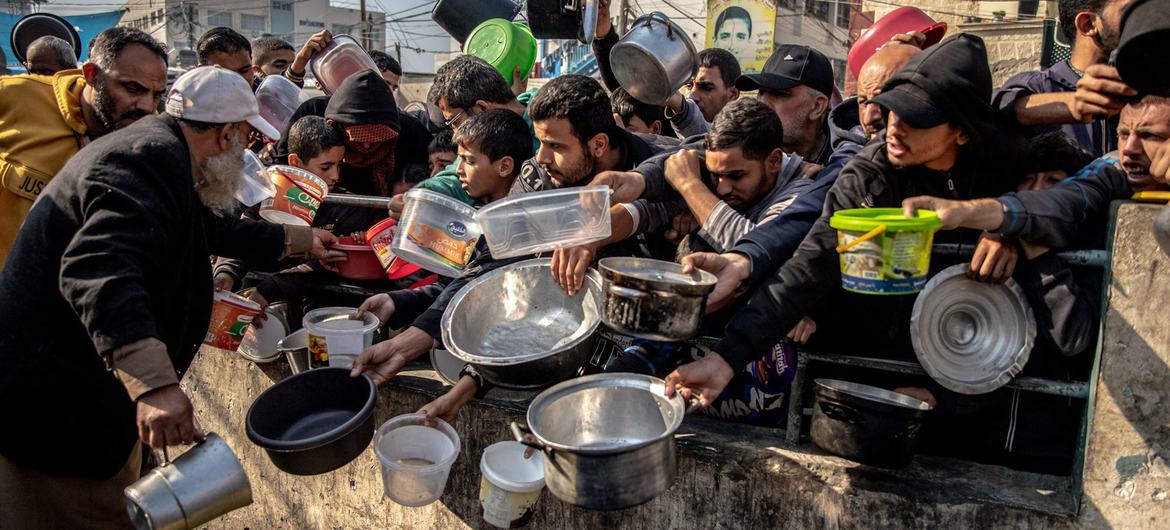The UN’s top humanitarian coordinator said the crisis in Gaza is nearing famine as Israel further restricts aid to the besieged coastal enclave. In just over three months, millions have been internally displaced, hundreds of thousands are starving, and tens of thousands have been killed by the Israeli military.
“Providing humanitarian assistance across Gaza is almost impossible. Our access to Khan Younis [in southern Gaza] and the Middle Area is largely absent,” Martin Griffiths, Under-Secretary-General for Humanitarian Affairs and Emergency Relief Coordinator, told the Security Council. “Our efforts to send humanitarian convoys to the North have been met with delays, denials, and the imposition of impossible conditions.”
One issue restricting aid deliveries is the Israeli inspection protocols. Griffiths explains that Tel Aviv’s inspections of aid had recently been tightened. “A growing list of rejected items means we are unable to bring into Gaza supplies to rehabilitate life-sustaining infrastructure,” the UN official said. Generators for hospitals and water treatment centers are on the list of banned items.
Last week, Sen. Chris Van Hollen (D-MD) described on ‘Face the Nation’ how Israel uses the inspection protocols to stifle aid deliveries into Gaza. “And when one item on a truck is rejected, the entire truck is rejected,” The Maryland Senator said. “And according to all the international [non-governmental organizations] that we talked about who have been operating in conflict zones around the world, they’ve never seen a worse process for assuring the safe delivery of humanitarian assistance.”
Additionally, Israel has restricted the equipment humanitarian aid workers have access to, making aid deliveries less safe and efficient. “The lack of respect for the humanitarian notification system puts every movement of aid workers in danger, as do the wholly insufficient quantities of armored vehicles and the limited communications equipment that we have been allowed to bring in,” he explained.
Griffiths reports the Israeli bombing has already been deadly and destructive for international aid organizations. “134 [UN Palestinian Relief Agency] facilities have been hit and 148 UN personnel and other aid groups staff have been killed,” he told the UN Security Council. The Israeli bombing of Gaza has killed at least 23,000 Palestinians, including nearly 10,000 children and 7,000 women.
Last week, the UN reported just 129 aid trucks entered Gaza each day on average. Before the war that has displaced at least 1.9 million Palestinians, 500 trucks entered the Strip each day. UNICEF says aid will not be enough to sustain Gaza, and commercial goods must be allowed into the Strip.
Lucia Elmi, UNICEF Special Representative, said, “The volume of commercial goods for sale in the Gaza Strip needs to increase and increase fast. What is needed is at least 300 trucks of private commercial goods going in on a daily basis.”
In addition to restricting aid, Israel has destroyed much of the life-supporting infrastructure in Gaza. Wim Zwijnenburg, a researcher at the Dutch organization PAX, identified through satellite imagery that Israel destroyed the solar panels that power a wastewater plant that services 1 million Palestinians. A water facility, located near the Indonesian Hospital, that serviced 30,000 Palestinians was also bombed. He found about 20 percent of Gaza’s farmland has been destroyed.
The bombing and lack of aid have created horrific conditions. Griffiths stated, “Colleagues who have managed to make it to the North in recent days describe scenes of utter horror: Corpses left lying in the road. People with evident signs of starvation stop trucks in search of anything they can get to survive.”
The UN official warned the risk of famine was increasing by the day. Aid groups have estimated that over 500,000 Palestinians are in a state of starvation, and the entire population of the Strip is facing acute food insecurity.
Griffiths also said the healthcare system had collapsed, and women could no longer safely give birth. Doctors in Gaza report performing medical procedures in crowded hallways and on floors. A lack of supplies causes many severe surgeries, including amputations on children, to occur without anesthesia.








